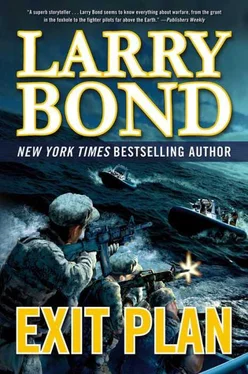3 April 2013
1700 Local Time/1400 Zulu
Bandar Kangan
She’d forced herself to eat, in spite of her fluttering insides. She had the baby to think about, and had dutifully worked her way though rice and vegetables at dinner, although it was a mechanical exercise. She felt a little light-headed, detached from herself.
It seemed like a fantasy. Normal people didn’t pass nuclear information to a foreign country. They didn’t meet American commandos on a beach. Maybe they’d stopped being normal when the two of them had decided to act on their consciences. She wanted a place to work and live as a family. She wanted them all to be safe and unafraid. Was this the price?
After an early dinner in Bandar Kangan, they’d wandered the town, having explored it thoroughly that afternoon. It had let her walk off some of her nervousness before one final visit to their hotel room.
It was supposed to be a stop to visit the bathroom and pick up a jacket, but they’d never come back here again. She’d packed lightly, with clothes for three nights, but now she would abandon it all. The instructions had said no luggage or belongings, but she took photos of her parents and tucked them into her jacket pocket. She changed her scarf, putting on her favorite, and stuffed another piece of material, a gift from her father, in the other pocket.
Yousef came out of the bathroom. “Are you ready?” She nodded, hesitating at first, then firmly. He’d changed into his uniform, and was wearing his sidearm. They’d discussed it, and had decided it might help if a Basij patrol or the police stopped them. He wore the sidearm because it was part of the uniform, not because he expected to use it. The idea of shooting one’s way out of Iran was ludicrous, not to mention he’d be shooting at other Iranians. The last thing he wanted to do was hurt someone just trying to do their duty.
They had half an hour to go nine kilometers, so they took their time driving around town, which let Yousef take one last look for unusual activity. Nothing had changed since their tour that afternoon, and they headed southeast on Highway 96.
They parked about half a kilometer past the pickup point, and pulled off the road onto a wide, smooth shoulder. The ocean lay a few dozen meters away from the road here, across a gently sloping sandy beach. Low dunes dotted with dark green scrub lay landward. To the southeast, a few low houses and buildings clustered along the highway, but behind them, in the direction of the pickup point, the coast was empty.
Yousef made sure Shirin had her jacket, although the air was still warm. “It will cool off quickly after the sun goes down.” He locked the car, partly out of reflex, but also to discourage casual investigation. He carried a blanket, so she could sit while they waited, and a water bottle.
The sun was still a few minutes above the horizon, which suited them both. “Watch your step,” he admonished needlessly. “There are a lot of uneven spots.” Gravel and sand crunched underfoot as they walked toward the water. Gradually, the area between the water and the highway became wider, until the road was hidden by dunes and scrub.
Half to himself, Yousef muttered, “This beach is so flat, so open. I wish there was more cover.” Then he added, “Is that why they chose it?”
Shirin nodded agreement, but stiffly. “I feel so exposed here.” She sounded tense. “What time is it?”
“Eighteen-fifteen. Almost sunset.”
Shirin pulled the GPS device from her pocket and checked it. “We’re close, less than a hundred meters from the rendezvous.”
“Watch for a big X on the ground.”
She laughed.
They waited. Although they never saw it move, the sun crept toward the horizon, swelled, reddened, and eventually disappeared, taking the daylight with it.
When it was no longer possible to tell a black thread from a white one, she asked, “How much longer?”
“It could be any time,” Yousef remarked.
They kept their vigil, alert for any sound, any movement. She tried counting the seconds in each minute, but lost count in the low two hundreds. After what seemed an eternity, Shirin finally looked at the clock on her GPS. It read 1940 hours. The Americans were late.
She watched toward the south, but the sound of waves and reflected starlight were the only signs of the gulf’s existence. The dark landscape at least held irregular shadows. With no moon, the sea was simply blackness. The Americans could be a few meters away, or more likely, not there at all.
To pass the time, Shirin made a game out of trying to get as close to the latitude and longitude as she could: 27 degrees, 47 minutes, 18 seconds north latitude, 52 degrees 7 minutes, 30 seconds east longitude. At the equator a mile of latitude is 1,854 kilometers, which made one second of arc 31 meters. How many steps would that be?
Yousef complained about the GPS display being too bright, but there was no dimmer control for the screen. She shielded it with her hand, zoomed it in to its tightest scale, and walked back and forth. The seconds display flickered as she moved from east to west, but it didn’t always decrease. After watching it drop from 32 to 31 seconds east, a few more steps brought it back to 32.
“Remember the satellites,” Yousef reminded her. “You don’t know what your error circle is. Maybe one went below the horizon.”
Irritated, Shirin spun around to face him. Whatever she was about to say died on her lips as a voice called out from the dunes to the left. Yousef heard a few words, just a phrase, but he couldn’t make it out.
Without thinking, he shouted, “Down!” and dropped to one knee, turning toward the sound. His pistol was in his hand, and he searched for a target, expecting VEVAK agents or Basij troops. The landscape was empty.
The phrase was repeated, and Yousef realized it was in Farsi. But it was just a nonsense phrase about starlight.
Shirin was still standing, far too large a target, even in the dark. She stood a few paces away, and turned to face the voice. He started to tell her again to get down, but she looked back at him for a second, then responded, but in English.
Her reply was answered with another phrase in Farsi, telling them to stand. By this time, Yousef realized that they were being watched, and that the watchers were certainly armed, and well hidden. He carefully lowered his pistol and holstered it.
Whether it was her latest reply or him putting away the pistol, a new shadow appeared in the dunes. It might be holding a rifle, but he couldn’t be sure. The stranger definitely held the advantage, but didn’t seem hostile. If he’d wanted to shoot, he and Shirin would already be dead.
Yousef slowly stood, keeping his hands open and visible. The shadow stood as well.
“It’s all right, Yousef, it’s them,” Shirin called, and he felt the tension drain out of him, almost taking his strength with it. Then a thrill of fear replaced it as another shadow appeared to his right. He also had a weapon, and had remained perfectly concealed, covering his comrade. Yousef offered a short prayer of thanks for his restraint.
USS Michigan, Battle Management Center
Captain Guthrie watched as a petty officer typed in commands, calling up a sequence of images. Lieutenant Frederickson explained each image as it appeared.
“These are all from the CENTCOM UAV. Its coverage includes the rendezvous point. Here’s the first image. At 1815, two people appear on the beach. They’re almost certainly the two Iranians we’re supposed to pick up. They stay in the same spot for over an hour, hardly moving at all. Okay, Lawrence, second image.”
Читать дальше












